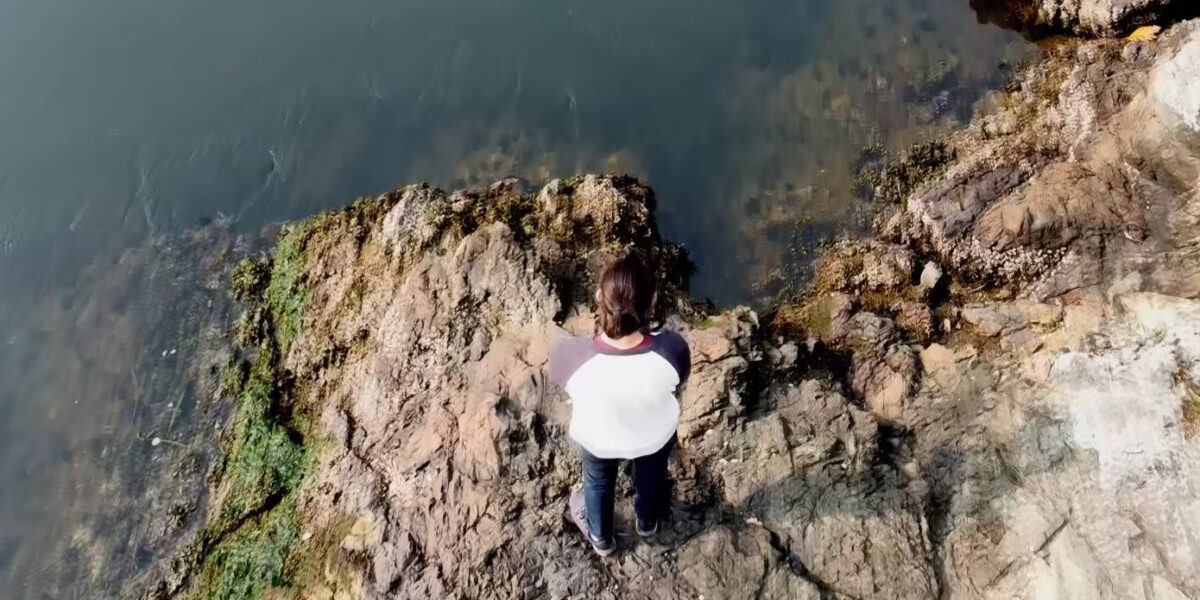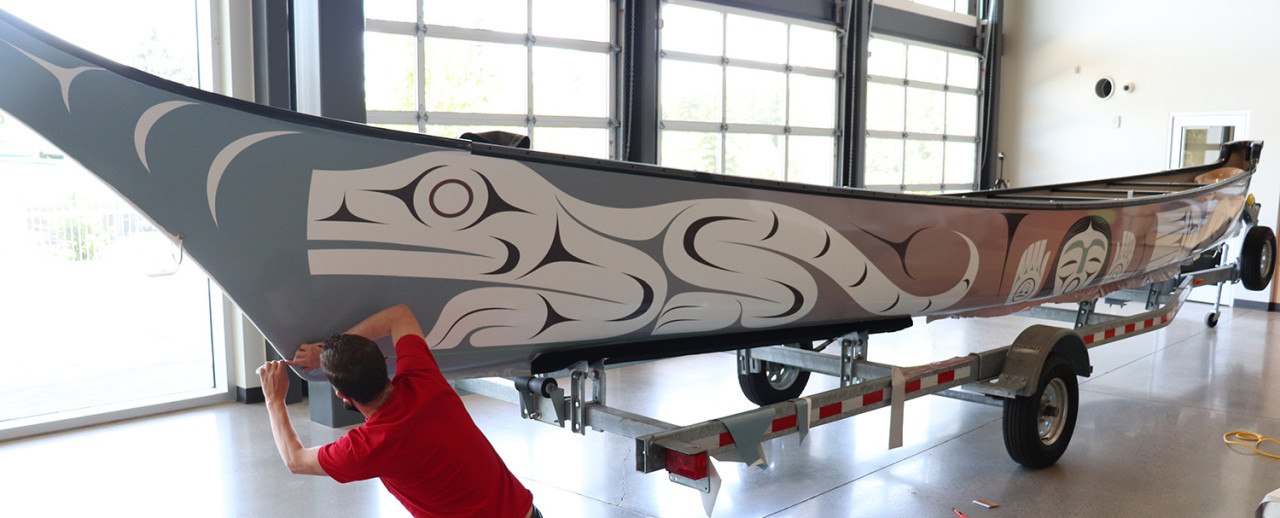Camosun’s new Indigenous canoe promotes reconciliation, unique educational opportunities
Travis Leask from Camosun's Print Shop, applies the 'wrap' featuring Coast Salish artist Dylan Thomas' design, to Camosun's new Indigenous canoe
Camosun’s new canoe, launched on National Indigenous Peoples’ Day, represents collaboration and interdisciplinary education—combining art, culture, science, and technology to produce a beautiful vehicle for experiential learning and reconciliation.
A traditional-style Indigenous canoe for Camosun College, decked out in beautiful artwork by renowned Coast Salish artist Dylan Thomas, was launched on National Indigenous Peoples’ Day this afternoon during a private smudging ceremony on the Gorge Waterway.
“We’re thrilled to launch a beautiful new canoe to facilitate experiential learning and advance our shared reconciliation efforts,” says Camosun President Sherri Bell. “We look forward to many years on the water, paddling and learning together with our local Indigenous partners.”
The design is based on the traditional ocean-going canoes used for hundreds of years by many different Indigenous peoples on the Pacific coast of North America. Camosun’s new canoe came out of the college’s Indigenization and Reconciliation plan that includes 39 actions in response to Canada’s Truth and Reconciliation Commission (TRC) calls to action.
“It personally makes me really, really happy,” says Janice Simcoe, Director of Eyēʔ Sqȃ’lewen, Camosun’s Centre for Indigenous Education and Community Connections. “This canoe is an exciting project that’s going to give our students and everyone in the Camosun community an opportunity to experience being out on the water and deeply, fully engaging in the kind of experiential learning that occurs when you are truly at one with what you’re doing, and that is so healing and cleansing.”
The canoe, made of fiberglass, is a ‘Pacific Dancer’ model and was manufactured by Clipper Canoes of Vancouver. At 36-feet long it can hold 18 paddlers plus a helmsperson. Camosun plans to use it for experiential education and to participate in the annual post-secondary canoe races held each year at Royal Roads University on June 21, postponed this year due to the pandemic.
“We are going to be using the canoe as an opportunity to do ‘on the land’ learning,” explains Simcoe. “As the people out here say, when we’re talking about the land, we’re actually also talking about the water and the sky at the same time and all the natural things that surround us.”
Many of Camosun’s Indigenous courses and programs offer a cultural camp experience, and the canoe will facilitate a deeper experience for participants. Students will have the opportunity to learn on the water, enriching their connection to traditional landscapes. Their journeys will also strengthen the college commitment to experiential education and Indigenous understanding. The canoe will also be available for Camosun employees across different departments to book for a unique team-building experience.
“When you’re paddling together, you have to work in rhythm with all of the other people, you have to become one,” explains Simcoe. “That is what the concept of Na'tsa'maht actually means—being of one mind and becoming one. It’s partly the healing work of getting back to nature, and it’s partly allowing yourself to be lost in the rhythm of community and become part of a greater whole. Na'tsa'maht, our beautiful building at Lansdowne campus, is named after the concept that is used in paddling together.”
The canoe arrived from the manufacturer as a blank canvas, ready for the application of Dylan Thomas’ unique artwork. Using in-house expertise, the team at Camosun Innovates was able to translate his artistic vision into a vibrant ‘wrap’ applied to the full length of the canoe on both sides.
“Our focus is always on the best solution for the challenge at hand, coupled with a commitment to learning, community, and respect,” explains Dr. Richard Gale, Director, Camosun Innovates. “We were honoured to be involved in the planning for and acquisition of this magnificent canoe, and happy to have been able to facilitate the Camosun print shop’s application of Dylan’s striking design. In many ways, this has been a perfect example of college collaboration in support of interdisciplinary education —combining art, culture, science, and technology to produce something that is quite literally a vehicle for learning and reconciliation.”
The private canoe launch ceremony, held in accordance with traditional practices and COVID-19 protocols, took place at the Victoria Canoe and Kayak Club (VCKC).After the smudging ceremony led by Indigenous ‘Old One’ Victor Underwood, community members and Camosun representatives in attendance were invited to paddle together where the waters meet and are transformed.
The club’s location has special significance to the college, as it is near the remaining part of the ‘Camossung’ rock, the place where the waters and currents meet on the Gorge Waterway, and the inspiration for the Camosun name, according to local Lekwungen legends and teachings.
This legend inspired Thomas’s artwork. He also created the college’s special 50th anniversary logo and new institutional seal, all deeply rooted in Coast Salish myth and historical narrative.
“He does amazing work,” says Simcoe. “The design is really cool and I hope that everyone loves it as much as I do.”

Camosun’s anniversary logo
Designed by Coast Salish artist Dylan Thomas, Camosun's 50th anniversary logo is deeply rooted in the local Indigenous myths and legends behind the Camosun name.
Contact information
Ivan Watson
Marketing & Communications StrategistCamosun College

